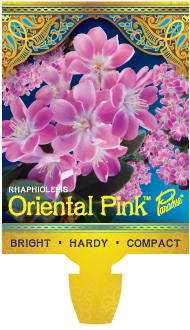If you like 'Oriental Pearl' you will LOVE 'Oriental Pink'. This New Rhaphiolepis has been selected at Paradise Plants for good vigour, spot free leaves, attractive pink flowers and neat rounded shape.
Oriental Pink is a bushy, low growing evergreen shrub that flowers in abundance in winter/spring. Flowers are soft pink borne in dense sprays. Foliage is deep glossy green.
Will grow Australia wide, they are tolerant of both heat and frost but may need protection in extreme situations especially while young.
Coastal or salt water pool plantings
Containers
Low maintenance gardens
Small hedges or borders
Mass planting
- Borders
- Containers
- Exotic
- Foliage
- Hedging
- Shrubs
- Standard
- Topiary
Full sun or part shade
Soil pH should be in the neutral range and poor or heavy soils should be improved with plenty of decomposed organic matter prior to planting and raised beds are recommended for areas with heavy clay soils.
Good drainage is required. Raphiolepis will not tolerate waterlogged soils.
Space plants 60cm apart for a hedge or border.
Planting holes should be approximately twice the width and depth of the pot to be planted and back filled with top soil improved with organic matter.
During establishment period deep watering is recommended to encourage a deep root system. Soil should be kept moist but not water logged. Watering can be slowly reduced as plants establish and begin to grow strongly.
Mulching will help to retain moisture levels in the soil and protect surface roots from extremes of temperature. Mulch layer should be 10cm deep and kept 10cm away from the base of the plant to help ensure adequate airflow around the stem.
Lightly prune after flowering if needed.
Twice a year in spring and summer with a high quality complete fertiliser.
 Look out for this label in all good garden centres.
Look out for this label in all good garden centres.